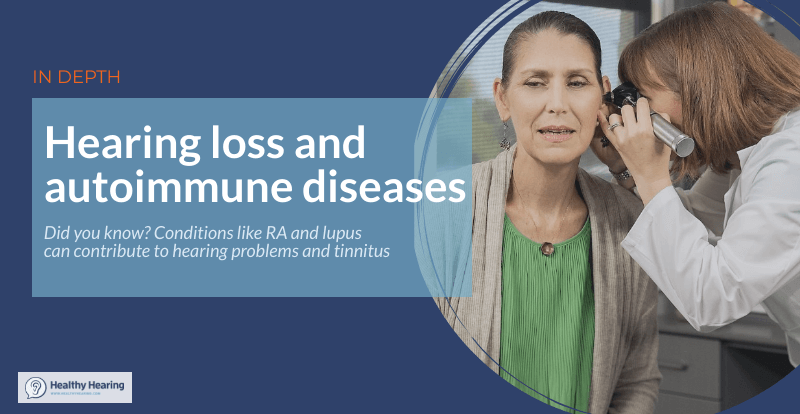|
www.HealthyHearing.com |
Autoimmune diseases and your hearingConditions like lupus and rheumatoid arthritis are linked to hearing loss and tinnitus
Contributed by Temma Ehrenfeld Did you know hearing loss can be related to an underlying condition—not simply age or noise exposure? When this happens, the condition is often an autoimmune disease such as rheumatoid arthritis (RA) or lupus. Research indicates that hearing loss, tinnitus and other hearing problems are more common among people with autoimmune disorders, so much so that audiologist Trisha Milnes encourages all her patients with autoimmune diseases to request hearing tests. Her clinic even makes a point of reaching out to patients with certain autoimmune-related illnesses, asking about their hearing, said Milnes, chief of Audiology and Speech Pathology at the Charlie Norwood Virginia Medical Center, a Veterans Health Administration facility. "It's very necessary," she explained.
What is an autoimmune disease?The immune system is our body's way of fighting off microorganisms that can make us sick. When functioning normally, the immune system can correctly identify and overcome infections. But sometimes, the immune system incorrectly identifies tissues in the body as dangerous, causing harmful types of inflammation when no actual threat is present. This malfunction can happen spontaneously—without a clear cause—or it can sometimes occur in reaction to an infection. One well-known autoimmune disease is type 1 diabetes. Other autoimmune diseases you may have heard of include RA, Hashimoto's autoimmune thyroiditis, Sjögren's syndrome, celiac disease, ankylosing spondilytis, Graves' disease, vitiligo, lupus, and psoriasis. (Note that allergies are not considered an autoimmune disorder.) How are autoimmune diseases linked to hearing loss?Not all autoimmune disorders affect hearing, but many of them do. Often the hearing damage is related to harmful inflammation in the delicate ear anatomy, or disrupted blood flow to the ear. The severity of the hearing loss can vary. Depending on the underlying disease, it can affect one or both ears, may develop suddenly or slowly, and may affect different frequencies (pitches). Given how complex both hearing and the immune systems are, it's not always possible to know what role an autoimmune disorder played in hearing loss. Autoimmune disorders can flare up and then go into remission, and a person may not ever realize the link to their hearing loss. "In many cases, though the hearing loss is permanent, the cause of the damage can be transitory, so there's no way to diagnose the cause of the damage after it has happened," explained Aaron Abend, executive director of the Autoimmune Registry, Inc. Treatment may include corticosteroids that limit blood vessel inflammation and the immune attack on the inner ear. For some autoimmune diseases, plasma transfers can clear the antibodies that attack phospholipids from the blood. Other treatments increase blood flow to the inner ear or suppress the immune system. When the hearing loss is permanent, hearing aids may be recommended. Autoimmune inner ear disorderThe autoimmune disease most directly connected to hearing is autoimmune inner ear disorder (AIED). In this rare disorder, immune cells attack the inner ear, leading to progressive hearing loss that may fluctuate. The hearing loss can be sudden, but according to an article in the Hearing Journal, the onset of AIED is usually slower, taking days to months. It can occur on its own, but data shows that about one-third of AIED patients also have a systemic autoimmune disorder, such as lupus or RA. Rheumatoid arthritis (RA)Rheumatoid arthritis (RA) is a chronic autoimmune illness that begins in the joints, usually in the hands, wrists and knees, and can spread in severe cases to internal organs. Studies range broadly in estimating how many RA patients develop hearing loss—but the answer ranges from may be as high as 72 percent. RA patients who are exposed to cigarette smoke are at higher risk of hearing loss. A 2020 research overview concluded that people with RA were more than four times as likely to have sensorineural hearing loss, but did not have more risk of conductive (blockages) or mixed hearing loss. In most cases, RA affects both ears, and the hearing loss may fluctuate. It typically affects the higher pitches, showing a dip on an audiogram at the higher frequencies. LupusSystemic lupus erythematosus is a chronic autoimmune illness that can affect the joints, skin, kidneys, blood cells, brain, heart, lungs—and ears. Sometimes hearing loss is the first symptom a patient notices. Studies range broadly in estimating the percentage of lupus patients who have hearing-related symptoms, but a recent estimate put it at about 25 percent. With lupus, hearing loss often begins in one ear, affecting high-pitched sounds, before spreading to the other ear and affecting lower pitches, known as reverse-slope hearing loss. It can also cause tinnitus (ringing in the ears), dizziness or aural fullness. Auditory processing disorder (APD) also may be an issue. FibromyalgiaAlthough historically fibromyalgia has not been considered an autoimmune condition, recent evidence suggests that the illness—marked by widespread pain and muscle weakness—is triggered by antibodies, which are part of the immune system. New evidence also indicates that the illness is associated with more than double the risk of hearing loss, causing problems like high-frequency hearing loss, hyperacusis, APD and dizziness. Lyme diseaseLyme disease is one of many infections that can lead to hearing loss or tinnitus. It is caused by exposure to a bacteria carried by ticks. There are reports that it can trigger lupus and separate research at Johns Hopkins in Baltimore demonstrates how the bacteria alters immune cells. It may be that the infection triggers autoimmune activity in people with a genetic vulnerability. In 2021, a hospital team in Krakow, Poland, reported that among 86 patients who were hospitalized because of sudden hearing loss over a year, nine showed signs of a Lyme infection and regained some or all of their hearing after treatment with antibiotics. People with late-stage Lyme also develop APD, hyperacusis, tinnitus, dizziness and poor balance, though not necessarily through autoimmune activity. Other conditionsThyroid issues and hearing lossLow thyroid levels and hearing loss are connected. Changes in thyroid levels as with Hashimoto’s and Graves’ can affect hearing, causing either sensorineural or conductive hearing loss. Skin disordersSkin conditions may also affect hearing. Vitiligo, which creates patches of skin without pigment, has been linked to a higher risk of sensorineural hearing loss. Psoriasis, which causes patches of scaly itchy skin, increases the risk of sudden sensorineural hearing loss by 50 percent.
Meniere's diseaseIt's unclear if Meniere's disease—which causes intermittent bouts of hearing loss, tinnitus, ear fullness and vertigo—is an autoimmune disease, though it does appear that the two often overlap, according to this study. Other factors that can affect your hearing
problems can cause hearing loss or tinnitus. Many autoimmune conditions can cause pain, and people may come to rely on aspirin, acetaminophen (Tylenol) or NSAIDs like ibuprofen. Frequent use of OTC painkillers has been tied to hearing loss, probably because they affect blood flow to the cochlea, in the inner ear. There are many other medications that can cause hearing loss or tinnitus. Are you coping with unexplained fatigue? That draggy feeling is one of the most common and frustrating symptoms of autoimmune illness and is also more common in people with hearing issues, though not necessarily related to the degree of hearing loss. It’s possible the combination is affecting you, notes Ben Hornsby, Associate Professor of Hearing and Speech Sciences at Vanderbilt University in Nashville, Tennessee. What can you do?If you've been recently diagnosed with an autoimmune disorder, keep in mind that your hearing can be affected. If you feel like you're not hearing well, get a hearing test to find out. And if you experience sudden or new changes in your hearing, let your doctor know right away. Temma EhrenfeldTemma Ehrenfeld is an award-winning journalist who covers psychology and health. Her work has appeared in major newspapers, magazines and websites. You can find more of her writing at her Psychology Today blog, Open Gently. Read more about Temma. |
Featured clinics near me
Earzlink Hearing Care - Reynoldsburg
7668 Slate Ridge Blvd
Reynoldsburg, OH 43068

Find a clinic
We have more hearing clinic reviews than any other site!


